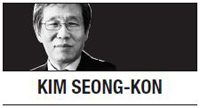Proverbs and maxims reflect the society from which they originate. Thus they vary depending on the peculiarities of nations, cultures and civilizations. If you are familiar with a certain nation’s proverbs, therefore, you can easily conjecture about the characteristics of the people of the country. Watching recent social and political disruptions of Korea these days, one can be reminded of Korean maxims that nicely match these situations.
Among others, the famous Korean proverb, “You only know one; you don’t know two,” comes to mind. It means that you are myopic and parochial. Perhaps the maxim corresponds to the current Korean government’s economic policy of drastically raising the minimum wage. Obviously, the policymakers did not foresee that their seemingly benevolent actions would cause massive dismissals of employees in small businesses and consequently make the economy falter.
The same thing happened during the Roh Moo-hyun administration. Politicians suppressed the real estate boom with the good intention of cooling down the skyrocketing housing costs. The result, however, was the bankruptcy of carpenters, masons, painters and construction workers, not real estate moguls.
Another Korean maxim is “If it’s free, you will even drink poison.” That means we like free giveaways very much. Perhaps that is why our politicians’ populist policies almost always appeal to people’s minds, such as free money for unemployed young people or half-price college tuitions. However, if we like free gifts too much, we will end up taking the consequences. Free things almost always entail something we should pay for later.
Also, Koreans often use the biblical maxim “You find a tiny speck in another’s eye, not seeing a crossbeam in your own eye.” It means that we tend to be find fault with others, not realizing our own flaws. This proverb reminds us of another Korean maxim, “When I do it, it’s romance; when others do it, it’s a scandal.” People say that it is especially an outstanding characteristic of today’s Korean politicians. A good example is our leftist superintendents who try to shut down prestigious private high schools designed for exceptionally bright students, while they sent their children to those same schools.
There are maxims that reveal our ungrateful tendencies. For example, “You save a drowning person, and he demands you to bring him his lost bag.” The above proverbs may refer to the anti-American sentiment among some Koreans. Thanks to the bloodshed of American soldiers, Korea was liberated from Japan, survived the Korean War, and escaped from being a communist country. However, some Koreans unabashedly express anti-American sentiment and demand more.
We also have a marked tendency to blame others. Thus there are several proverbs that reflect such a trait, “A blind man blames the ditch after accidently falling into it.” Another relevant proverb is “When things go well, you give credit to yourself. When things go badly, you blame your ancestors.” Indeed, Koreans almost always seem to blame other countries for Korea’s problems. As a result, our politicians do not need to assume responsibility no matter what, because they can conveniently blame other nations for their own mistakes and errors.
There are maxims about our political leaders’ incompetence in the international community. For example, “A general with a broken leg harangues only inside his castle.” Inside Korea, our politicians arrogantly boss people around, but outside, they suddenly turn into hopelessly timid, incompetent men. Unable to speak the global language, English, they are unable to communicate or socialize with their foreign counterparts, thereby frequently being ignored and mistreated in foreign countries. We do hope our political leaders can be competent and outstanding overseas because they project an image of Korea to the rest of the world.
Some proverbs, such as “A puppy is not afraid of a tiger” teach us that we should be humble and modest and know our position and capabilities. Of course, we should be confident and proud. At the same time however, we should know our limits. In the eyes of foreigners, Koreans sometimes gravely overestimate themselves and do not hesitate to provoke countries they are not supposed to mess with. We should be gentle, courteous, and discreet, and act accordingly.
Another Korean proverb, “You cooked tasty soup, and your dog ate it,” means what we have accomplished could easily go down the drain. It could be an appropriate warning for South Korea, for all of our economic prosperity and accomplishments will be taken from us by another country unless we make the right choice in this critical juncture. Some maxims, such as “You drive a stake into other’s pumpkins,” “You throw ashes into food you are not allowed to eat,” or “You puncture a persimmon when you cannot eat it,” too, reflects our undesirable attitude of being nasty to those we are jealous of. Another maxim, “If sweet, you swallow it; if bitter, you spit it out,” also criticizes our quick temper and indiscreet attitude.
Proverbs reflect the customs and mind of the people they come from. They contain wisdom and warnings that we should bear in mind.
By Kim Seong-konKim Seong-kon is a professor emeritus of English at Seoul National University and a visiting professor at the University of California, Irvine. -- Ed.






